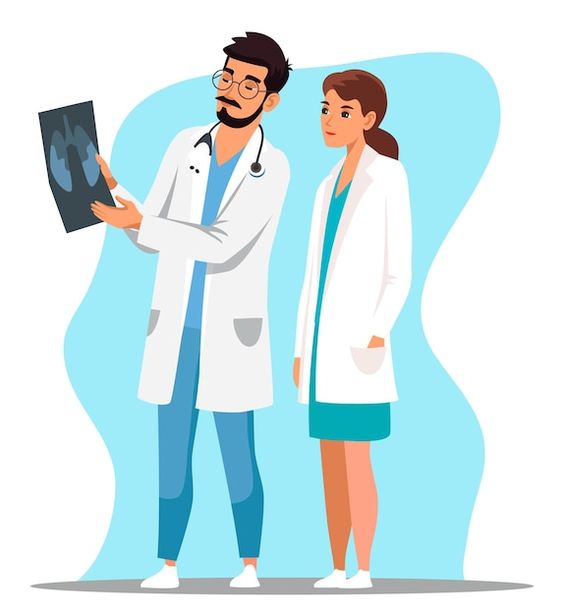
Table of Contents
Conquering Clinical Rotations
Conquering Clinical Rotations
Imagine standing confidently at the bedside with a stethoscope around your neck and a reassuring smile. You’ve just finished taking a patient’s vital signs and explaining their upcoming procedure with clarity and empathy. This wasn’t always the case. A few months ago, conquering clinical rotations seemed daunting, filled with unknowns. But through hard work, preparation, and the guidance of this very article, you transformed from a book-smart student to a capable and compassionate nurse-in-training. This is the power of conquering clinical rotations.
Importance of Clinical Rotations
Clinical rotations are the bridge that connects the theoretical knowledge you’ve gained in nursing school to the real-world practice of caring for patients. It’s where textbooks come alive, giving you the invaluable opportunity to:
- Gain hands-on experience with essential nursing skills like medication administration, wound care, and patient assessments.
- Develop your clinical judgment by analyzing patient data and making informed care decisions.
- Build your confidence as you successfully navigate patient interactions and healthcare team dynamics.
What You Will Learn in This Guide
This comprehensive guide will equip you with the tools and strategies to survive and thrive in your clinical rotations. We’ll delve into:
- Pre-clinical preparation: Learn how to get ahead by researching your rotations and practising basic skills.
- Essential skills for success: Discover the crucial communication, assessment, and critical thinking skills you need to excel.
- Communication tips: Master the art of interacting with patients and the healthcare team with confidence and empathy.
- Overcoming challenges: Develop strategies to manage stress, handle difficult situations, and navigate any obstacles that may arise.
By the end of this guide, you’ll be armed with the knowledge and confidence to approach your clinical rotations with a positive attitude and a thirst for learning. Remember, this is a crucial step in your journey to becoming a remarkable nurse. Let’s get started in conquering clinical rotations
Pre-Clinical Preparation

Understanding Clinical Rotations
Before diving headfirst into your clinical rotations, it’s crucial to understand their purpose and structure. Clinical rotations, also known as practicums, are immersive experiences where you apply the knowledge you’ve learned in the classroom to real-world patient care settings. You’ll shadow nurses, assist with tasks, and gradually gain confidence in performing clinical skills.
There are various clinical rotations, each focusing on a specific patient population or care area. Common examples include:
- Medical-Surgical: This rotation focuses on adult patients with a wide range of acute and chronic conditions requiring surgery or medical interventions.
- Pediatrics: This rotation focuses on caring for infants, children, and adolescents, addressing their unique needs and developmental stages.
- Mental Health: This rotation provides experience caring for patients with mental health conditions learning therapeutic communication and assessment techniques.
Your rotations’ specific schedule and expectations will vary depending on your school’s program and the clinical facilities you’ll be assigned to. Ensure you receive a clear outline of each rotation, including the duration, learning objectives, and any specific dress code requirements.
Preparation is Key:
Preparation is the cornerstone of success in conquering clinical rotations. Here are some key strategies to get yourself ahead of the game:
- Research the Clinical Site and Patient Population: Dedicate some time to researching the healthcare facility where you’ll complete your rotation. Familiarize yourself with their services, specialties, and the typical patient population they serve.
Websites like https://www.allalliedhealthschools.com/about/ can be a helpful starting point for gathering information about different healthcare facilities.
Knowing what to expect can alleviate anxiety and allow you to focus on learning during your rotations. Opens in a new windowwww.allalliedhealthschools.com Nurse researching on laptop
Additionally, research common diagnoses and procedures encountered in that specific area. Familiarize yourself with basic terminology and treatments related to the patient population you’ll be interacting with. This prior knowledge will enhance your understanding and allow you to participate more actively during your rotations.
- Review Course Materials Relevant to Your Rotation: Revisit the course materials from your nursing classes that relate to the specific area of your upcoming rotation. This will refresh your memory on key concepts and theoretical frameworks. Before stepping into the clinical setting, utilize textbooks, lecture notes, and any assigned readings to solidify your understanding.
- Practice Basic Nursing Skills in the Skills Lab : Many nursing schools offer access to skills labs with mannequins and simulation tools. Utilize this valuable resource to practice basic nursing skills like vital signs measurement, medication administration, and aseptic technique. Mastering these skills in a controlled environment will boost your confidence and ensure proper technique during your rotations.
Essential Skills for Clinical Success

Clinical rotations are not just about mastering technical skills; they require a well-rounded skillset to provide exceptional patient care and collaborate effectively within the healthcare team. Here are three fundamental areas to focus on:
Communication Skills :
Clear and concise communication is the cornerstone of successful nursing practice. You’ll interact with patients from diverse backgrounds and healthcare professionals with varying experience levels. Here’s how to excel in communication:
- Active Listening Skills : Be a patient and attentive listener. Pay close attention to what your patients say and their nonverbal cues like facial expressions and body language. This demonstrates empathy and understanding, allowing you to tailor your communication to their needs. Actively listen not only to patients but also to healthcare team members during rounds or handoff reports. This ensures you grasp the bigger picture and can contribute meaningfully to discussions.
- Effective Communication with Patients: Explain procedures and treatments in a clear, concise, and understandable manner. Use language appropriate for the patient’s age and level of comprehension. Address their concerns and answer questions confidently, demonstrating your knowledge and commitment to their well-being.
- Professional Communication with Healthcare Team : Introduce yourself and your role clearly whenever interacting with new healthcare professionals. Provide clear and concise updates on patient status, including vital signs, changes in condition, and any concerns you may have.
Feel free to ask clarifying questions when unsure about specific instructions or procedures. Maintain a respectful and professional tone throughout your interactions.
Assessment Skills :
Comprehensive patient assessments are crucial for identifying potential problems and ensuring appropriate care. This includes:
- Performing vital signs measurement accurately: Master the proper technique for measuring temperature, pulse, respiration, blood pressure, and oxygen saturation.
- Collecting subjective and objective data: Gather information about the patient’s symptoms, medical history, medications, allergies, and social factors. This paints a holistic picture of their health status.
Critical Thinking Skills:
Critical thinking is analyzing patient data, identifying potential problems, and making sound clinical judgments. This involves:
- Analyzing patient data and identifying potential problems: Interpret assessment findings, lab results, and other information to understand the patient’s condition and possible risks.
- Making sound clinical judgments: Utilize your knowledge and understanding of best practices to determine appropriate interventions for patient care.
- Prioritizing patient care needs: Identify the most pressing concerns and prioritize your actions accordingly.
By honing these essential skills, you’ll be well-equipped to navigate the complexities of clinical rotations and contribute meaningfully to patient care.
Clinical Rotation Day: Performance Tips
The big day has arrived. Now that you’ve prepared and honed your skills let’s delve into how to make the most of your clinical rotation days, thereby; conquering clinical rotations.
Arrival and First Impressions :
Punctuality and professionalism are paramount. According to the facility’s dress code, arrive at the clinical site on time. First impressions matter, so greet your nurse preceptor and other staff members with a confident smile and introduce yourself.
Patient Care and Procedures:
Your primary focus will be patient care. Here’s what to remember:
- Follow Your Preceptor’s Lead: Your nurse preceptor is there to guide and support you. Review the assigned patient care plan together and follow their instructions meticulously.
- Be Proactive and Eager: Demonstrate a willingness to learn and assist with tasks. Offer to take vital signs, help with patient hygiene, or answer call bells under supervision. Initiative shows enthusiasm and a desire to contribute.
- Clarify When Unsure: Don’t hesitate to ask clarifying questions when unsure about a procedure or medication administration. It’s better to ask than to make a mistake that could impact patient safety.
- Perform Skills with Confidence: Perform a task under your preceptor’s supervision using proper technique. Remember your practice sessions in the skills lab!
Documentation :
Accurate and concise documentation is essential for patient care continuity. Throughout the day, diligently document all assessments, interventions performed, and patient responses in the electronic health record (EHR) or designated charting system.
Professionalism :
Maintain a positive and respectful attitude throughout your shift. Be mindful of patient privacy and confidentiality, ensuring conversations and information are kept discreet. Demonstrate teamwork and collaboration with the healthcare team. Offer assistance to other nurses and participate in huddle discussions when appropriate. You’ll create a more collaborative learning environment by being a positive and helpful team member.
Remember, clinical rotations are a learning experience. Mistakes can happen, but the key is to learn from them. Be open to feedback from your preceptor and actively seek opportunities to improve your skills. Following these tips’ll make a positive impression on your team and gain valuable clinical experience during your rotations.
Communication Strategies
Effective communication is the lifeblood of nursing. It allows you to connect with patients, build trust, and ensure high-quality care. Here’s how to master communication during your clinical rotations:
Communicating with Patients :
- Therapeutic Communication Techniques :
- This patient-centred approach focuses on creating a safe and supportive environment. Utilize techniques like active listening (discussed earlier) to demonstrate empathy and respect.
- Provide clear and concise information about their condition, treatment plan, and potential risks. Break down medical jargon into understandable terms and encourage them to ask questions. Maintain a calm and professional demeanour, even in stressful situations.
- Building Rapport with Patients :
Go beyond the clinical interaction. Take time to get to know your patients personally by asking open-ended questions about their interests and backgrounds. Find common ground and build trust by acknowledging their concerns and fears.
You’ll gain valuable insights into their needs and preferences by fostering positive interactions, leading to better individualized care and conquering clinical rotations.
- Cultural Competency:
Be mindful of cultural differences that may affect communication. Patients may have varying beliefs about healthcare and communication styles.
Use respectful language and avoid stereotypes. Utilize interpreters or cultural competency resources to ensure clear communication and avoid misunderstandings.
Communicating with the Healthcare Team :
Clear and concise communication is crucial for collaboration within the healthcare team. Here’s what to remember:
- Provide clear and concise updates on patient status: During shift changes or rounds, report on your assigned patients’ vital signs, pain levels, response to interventions, and any changes in their condition.
- Report any Changes in Patient Condition Promptly: Don’t hesitate to escalate concerns if you notice a sudden change in a patient’s vital signs, mental status, or behaviour. Early communication allows the team to address potential complications promptly.
- Ask Clarifying Questions When Needed: If you’re unsure about a doctor’s order or a treatment plan, don’t hesitate to ask clarifying questions. Confirming instructions is better than making a mistake that could impact patient safety.
- Maintain a Professional and Respectful Communication Style: Address all members of the healthcare team with respect, including doctors, nurses, therapists, and aides. Use professional language and avoid gossip or negativity. You’ll contribute to a collaborative and supportive work environment by fostering positive communication.
Effective communication is a skill that takes practice and refinement. By actively listening, practicing empathy, and utilizing these tips, you can build strong relationships with patients and healthcare professionals, paving the way for a successful nursing career.
Overcoming Challenges
Clinical rotations and can be exhilarating, offering hands-on experience and valuable learning opportunities. However, it’s natural to encounter challenges along the way. Here’s how to tackle some common hurdles:
Feeling Overwhelmed:
Clinical rotations can be demanding, filled with new information, complex procedures, and patient interactions. It’s normal to feel overwhelmed at times. Don’t be afraid to acknowledge these feelings.
- Seek Support: Talk to your preceptor or instructor – they are there to guide you. Express your concerns and ask for clarification or additional practice opportunities.
- Break down Tasks: Feeling overwhelmed often stems from large, undefined tasks. Break down your workload into smaller, more manageable steps. This will make them seem less daunting and allow you to focus on one thing at a time.
Making Mistakes:
Everyone makes mistakes, especially during the learning process. The key is to handle them constructively:
- Own Your Mistakes: If you make a mistake, be honest and upfront with your preceptor. Don’t attempt to cover it up.
- Learn from the Experience: Analyze what went wrong and discuss it with your preceptor. Understand the root cause of the mistake to prevent it from happening again.
- Maintain a Positive Attitude: Don’t let one mistake define you. Learn from it and move forward with a positive and resilient attitude.
Difficult Patients or Situations:
You’ll encounter patients with diverse personalities and complex situations. Here’s how to navigate challenging scenarios:
- Maintain Professionalism: Maintaining a professional and compassionate demeanor even with difficult patients.
- Focus on De-escalation: If a patient becomes agitated or angry, focus on de-escalation techniques. Speak calmly, validate their feelings, and ensure their safety and the safety of others.
- Seek Guidance: Don’t hesitate to ask your preceptor for guidance in handling a challenging patient or situation. Their experience can offer valuable insights and support.
Remember, clinical rotations are a learning experience. Embrace the challenges as opportunities for growth. By utilizing these strategies and seeking support when needed, you can navigate any obstacles and emerge from your rotations as a more confident and capable nurse.







